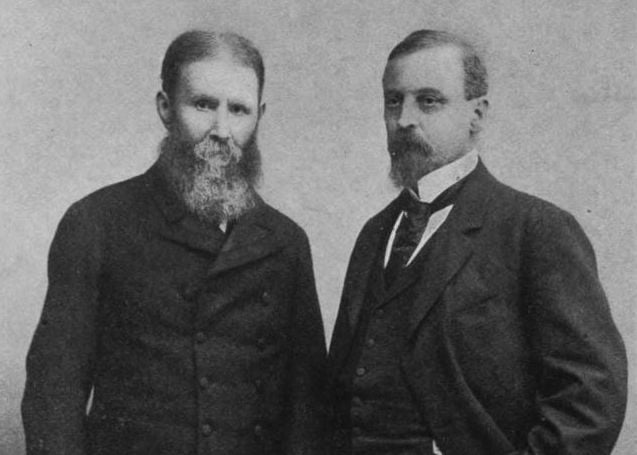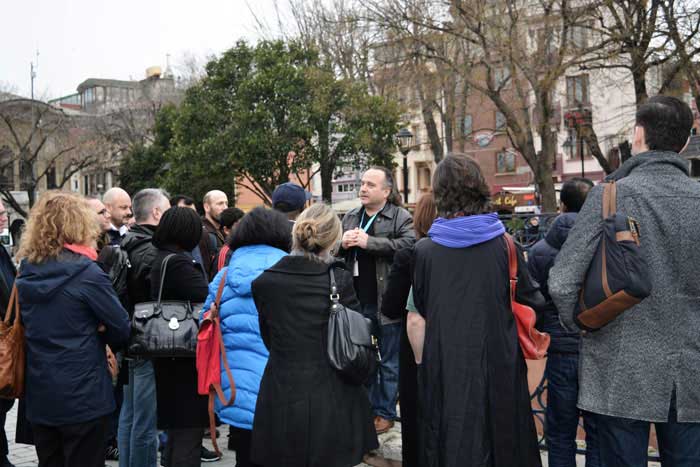Heliodorus (3rd Century, A.D.)
Heliodorus was one of the earliest writers of the novel, or romance. Though he lived long after the close of the Golden Age of Greek lit-erature, he is (together with Longus) the initiator of the novel form. But like many novelists (even modern novelists, who are supposed to know better), he interspersed his romance with episodes which are in themselves short stories. The very first chapter of the Ethiopian Romance, which is here reprinted, is such a story.
The present version is slightly modified and modernized from the early English translation by Thomas Underdowne. There is no title to the story in the original.
The Robbers of Egypt
At the first smile of day, when the sun was just beginning to shine on the summits of the hills, men whose custom was to live by rapine and violence ran to the top of a cliff and stretched toward that mouth of the Nile which is called Heracleot. Standing awhile, they viewed the sea underneath them, and when they had looked a good season afar off into the same and could see nothing which could put them in the hope of prey, they cast their eyes toward the neighboring shore, where a ship lay moored, without sailors but full-freighted; which thing they who were afar off might easily conjecture, for the cargo brought the water up to the ship`s third loading-line. But on the shore every place was full of men newly slain, some quite dead, some half dead, some whose bodies yet panted and plainly declared that there had been a battle fought of late.
There could be seen no signs or tokens of any just quarrel, but only some poor confused remnants of an unlucky banquet which had ended so. For the tables were furnished with delicate dishes, some whereof lay in the hands of those that were slain, having served as weapons in the battle so suddenly begun. Other tables covered such as had crept under them to hide themselves, as they thought. Besides, the cups were overthrown and fallen from the hands, either of them that drank or those who had, instead of stones, used them. For that sudden mischief wrought new devices, and taught them instead of weapons to use their pots. Of those who lay there, one was wounded with an ax, another was hurt with the shells of fishes, whereof on the shore there was great plenty; another was battered with a club, many burnt by fire, and the rest by divers other means, but most of all were slain with arrows.
To be brief, God showed a wonderful sight in so small a space, imbruing wine with blood, joining battle with banqueting, mingling indifferently slaughter with drinking, and killing with quaffings, providing such a sight for the thieves of Egypt to gaze at. For they, when they had looked upon these things a good while from the hill, could not understand what that sight meant, forasmuch as they saw some slain there, but the conquerors could they see nowhere. A manifest victory, but no spoils taken away, a ship without mariners, but, as concerning other things, untouched, as if she had been kept with a guard of many men, and lay at road in a peaceful harbor.
But though they knew not what the thing meant, they still had regard for gain, and deeming themselves to be victors, hurried with all speed to seize their booty. They were but a little way from the ship when they saw a sight more perplexing than the rest a great deal.
Present mischancelent beauty, who almost might be supposed a goddess, sat upon a rock seeming not a little to be grieved with that present mischance, but for all that of excellent courage. She had a garland of laurel on her head, a quiver on her back; to her left shoulder a bow was fastened, and her left arm hung carelessly down. Her right elbow she rested upon her thigh, holding her cheek in her hand, looking downward without moving her head, beholding a certain young man who lay before her, the which was sore wounded and seemed to lift up himself as if he had been awakened out of a dead sleep, almost of death itself.
Yet was he in this case of singular beauty, and although his cheeks were besprinkled with blood, his whiteness did appear so much the more. He was constrained for grief to close his eyes, but the sight of the maiden drew them towards her, and they must needs see, because they saw her. As soon as he came to himself he heaved a deep sigh and uttered these words very faintly, “And art thou safe indeed, my sweetheart?” quota he. “Or hast thoub by thy death augmented the slaughter? Canst thou not endure, even after death, to be separated from me, that now a vision of thy spirit haunts this place of trouble?” “Nay,” answered the maid, “on you doth all my estate depend, for good or ill, for this cause, you see”—showing a knife in her hand— “this has hitherto been waiting, and only by the chance of your recovery was restrained.”
As soon as she had said thus, she leaped from the stone, and they who were on the hill, as well for wonder as also for the fear they had, as if they had been stricken with lightning, ran every man to hide them in the bushes there beside. For she seemed to them a thing of greater price, and more heavenly when she stood upright, and her arrows with the sudden moving of her body gave a clash on her shoulders, her apparel wrought with gold glistened against the sun, and her hair under the garland, blown about with the wind, covered a great part of her back. The thieves were greatly afraid; and even more than what they saw did their ignorance of what had happened before terrify them. Some of them said indeed it was a goddess—Artemis, or Isis, the lady of the land—others declared it was a priestess of the gods who, replenished with divine fury, had made the great slaughter which there appeared. And they every man gave his verdict, because they knew not yet the truth.
Goddess kiss
But she, hastily running to the young man, embraced him, wept for sorrow, kissed him, wiped away his blood and made pitiful moan, scarcely believing that she held him in her arms. Which things when the Egyptians had seen, they turned their opinions: “And are these,” said they, “the works of a goddess? Would a goddess kiss a dead man with such compassion?” They determined therefore with themselves that it was best to take heart of grace, and draw near to find out the truth. When they had therefore encouraged each other a little, they ran down and found the maid busy in dressing the young man`s wounds, and coming behind her, suddenly stood still, and durst neither speak nor do anything more for their lives.
When she heard the noise around her, and saw their shadows before her eyes, she lifted herself up a little and looked back, but then at once stooped down again, no whit dismayed by the strange color of their skin, nor yet abashed to see the thieves in harness, but applying herself only to bind up his wounds that lay before her. Such is the force of earnest desire and true love: it despiseth all outward chances, be they pleasant or otherwise, only beholding that which it loveth, and thereabout bestowed all diligence and travail. But when the thieves passed by and stood before her, and seemed as though they would enterprise somewhat, she lifted herself up again and beholding them black and ill-favored, said: “If you be the spirits of those who are slain here, you trouble us wrongfully, for most of you were slain by your own hands.
Not understanding
As for us, if we slew any, we did it but in our own defense to repel the violence which was proffered to my virginity. But if you be men alive, it seemed you are thieves, and you have come here in good season. Rid us, I pray, from these present miseries, and by death finish this our unhappy tragedy.” Thus did she sorrowfully lament. But they, not understanding what she said, left them there, accounting their weakness a sufficient guard, and hastened to the ship, and brought out that which was in the same, paying no regard to other things whereof therein was great store, but every man bearing out as much as he could, of gold, silver, precious stones and silk. And when they thought they had enough, and there was such plenty as might satisfy even a thief`s greed, laying their booty on the shore, they fell to dividing it into portions such as they could carry, not according to the worth and value of what they had, but contenting themselves with equality of weight. As for the young man and the maid, they would take order for them afterwards.
In the meantime, another company of thieves, whereof two horsemen were captains, came toward them: which thing as soon as those saw that had been there before, having no courage to oppose them, they ran away as fast as they could, without taking with them any part of the prey, that they might give their enemy no occasion to pursue them. For they were in number but ten, and those who came upon them were three times as many. And so the maid and her companion, though not yet prisoners, were again in durance.
But the robbers, although they were eager for the spoil, yet, partly because they knew not what those things signified which they saw, and partly also for fear, stayed themselves a while, thinking that the former slaughter had been made by the thieves that had been there before. But when they beheld the maid in her fine foreign dress, who despised the dangers that hung over her head as if they had been none, and altogether employed her care to ease the young man`s wounds, taking his grief as heavily as her own sorrow they not only marveled at her beauty and high spirit but were wonderfully moved by the comeliness of the wounded San`s person, buch was the seemhness of his countenance, and tallness of his stature as he lay before them. For by this time he was a little mended, and his person had recovered its old handsomeness again. At length after they had beheld them a good while, he drew neafwho was S and laid hand on the maid, and bade her arise and follow him.
She has understood not what he said, conjecturing what he wished her, himself holding her fast, and pointing with a knife to her breast, threatened that she would kill herself if they carried them not away both together. Which thing when e master, partly by her talk but more plainly by her gesture, under- stood, hoping also to use the young man`s help in great affairs when he recovered, he ahghted himself from his horse and commanded his harness-bearer likewise so to do, and set his prisoners upon them. Then thered up the Prey to follow them. He himself like a lackey ran by their side and stayed them upright if by reason of their infirmity they were likely to fall. Surelv this deed not without glory; for he who was their master now waited upon them, and he who took them prisoners was content to serve them. Such is the impres. Mon that nobility makes, and such the force of comeliness, which can subdue the disposition of thieves and bring under the wild and savage.
Read More about The Prodigal Son








